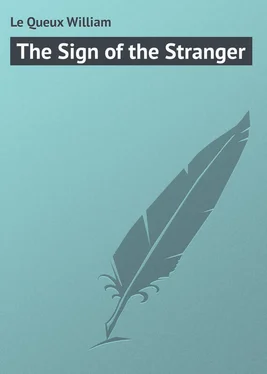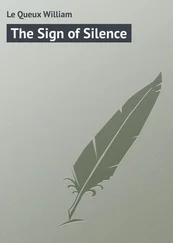William Le Queux - The Sign of the Stranger
Здесь есть возможность читать онлайн «William Le Queux - The Sign of the Stranger» — ознакомительный отрывок электронной книги совершенно бесплатно, а после прочтения отрывка купить полную версию. В некоторых случаях можно слушать аудио, скачать через торрент в формате fb2 и присутствует краткое содержание. Жанр: foreign_prose, на английском языке. Описание произведения, (предисловие) а так же отзывы посетителей доступны на портале библиотеки ЛибКат.
- Название:The Sign of the Stranger
- Автор:
- Жанр:
- Год:неизвестен
- ISBN:нет данных
- Рейтинг книги:4 / 5. Голосов: 1
-
Избранное:Добавить в избранное
- Отзывы:
-
Ваша оценка:
- 80
- 1
- 2
- 3
- 4
- 5
The Sign of the Stranger: краткое содержание, описание и аннотация
Предлагаем к чтению аннотацию, описание, краткое содержание или предисловие (зависит от того, что написал сам автор книги «The Sign of the Stranger»). Если вы не нашли необходимую информацию о книге — напишите в комментариях, мы постараемся отыскать её.
The Sign of the Stranger — читать онлайн ознакомительный отрывок
Ниже представлен текст книги, разбитый по страницам. Система сохранения места последней прочитанной страницы, позволяет с удобством читать онлайн бесплатно книгу «The Sign of the Stranger», без необходимости каждый раз заново искать на чём Вы остановились. Поставьте закладку, и сможете в любой момент перейти на страницу, на которой закончили чтение.
Интервал:
Закладка:
The smoky sunset haze had settled over the Thames as I crossed Westminster Bridge in search of the pawnbroker’s whose voucher had been found in the dead man’s pocket, and a copy of which I had obtained before leaving Sibberton. It had been a blazing August day and every Londoner who could afford to escape from the city’s turmoil was absent. Yet weather or season makes no appreciable difference to those hurrying millions who cross the bridges each evening to rush to their ’buses, trams or trains.
At six o’clock that summer’s evening the crowd was just as thick on Westminster Bridge as on any night in winter. The million or so of absent holidaymakers are unnoticed in that wild desperate fight for the daily necessaries of life.
Without difficulty I found the shop where a combined business of jeweller’s and pawnbroker’s was carried on, and having sought the proprietor, a fat man in shirt-sleeves, of pronounced Hebrew type, I requested to be allowed to see the pledge in question.
He called his assistant, and after the lapse of a few minutes the latter descended the stairs carrying a small well-worn leather jewel-case which he placed upon the counter. The instant I saw it I held my breath, for upon it, stamped in gold, was the coronet and cipher of Lady Lolita Lloyd!
The pawnbroker opened it, and within I saw a necklet of seed pearls and amethysts which I had seen many times around my love’s throat, an old Delhi necklace which her father had bought for her when in India years ago. In her youth it had been her favourite ornament, but recently she had not worn it.
Was it possible that it had been stolen – or had she made gift of it to him?
I took up the familiar necklet and held it in the hollow of my hand. I recollected how Lolita, with girlish pride, had shown it to me when she had received it as a present on her eighteenth birthday, and how, on occasions at parties and balls at Government House afterwards, it had adorned her white neck and its rather barbaric splendour had so often been admired.
“It’s unredeemed, you know,” remarked the black-haired Jew. “You shall have it for twenty pound – dirth cheap.”
Ought I to secure it? The police would, no doubt, soon institute inquiries, and finding the coronet and cipher upon the case would at once connect my love with the mysterious affair. But I had by good fortune forestalled them, therefore I saw that at all hazards I must secure it.
I pretended to examine it in the fading light at the window, lingering so as to gain time to form some plans. I had not twenty pounds in my pocket; to give a cheque would be to betray my name, and the banks had closed long ago.
At last, after some haggling, more in order to conceal my anxiety to obtain it than anything else, I said, with affected reluctance —
“I haven’t the money with me. It’s a pretty thing, but a trifle too dear.” And I turned as though to leave.
“Well, now, ninetheen pound won’t hurt yer. You shall ’ave it for ninetheen pound.”
“Eighteen ten, if you like,” I said. “What time do you close?”
“Nine.”
“Then I’ll be back before that with the money,” I answered, and I saw the gleam of satisfaction in the Hebrew’s eyes, for it had been pawned for five pounds. He, however, was not aware that it was I who was getting the best of the bargain.
I drove in a cab back to the Constitutional Club, where I had left my bag for the night, and the secretary, a friend of mine, at once cashed a cheque, with the result that within an hour I had the necklet and deposited it safely in my suit-case, gratified beyond measure to know that at least I had baffled the police in the possession of this very suspicious piece of evidence.
From the Jew I had endeavoured to ascertain casually who had pledged the ornament, but neither he nor his assistant recollected. In that particularly improvident part of London with its floating population of struggling actors and music-hall artistes, each pawnbroker has thousands of chance clients, therefore recollection is well-nigh impossible.
Having successfully negotiated this matter, however, a second and more difficult problem presented itself, namely, how was I to avoid delivering the letter to Sir Stephen Layard, the Home Secretary – the Earl’s request that the Criminal Investigation Department should hound down the woman I adored?
My duty was to go at once to Pont Street and deliver the Earl’s note, but my loyalty to my love demanded that I should find some excuse for withholding it.
I stood on the club steps in Northumberland Avenue watching the arrivals and departures from the Hotel Victoria opposite, hesitating in indecision. If I did not call upon Sir Stephen, then some suspicion might be aroused, therefore I resolved to see him and during the interview nullify by some means the urgency of the Earl’s request.
The Cabinet Minister, a middle-aged, clean-shaven man with keen eyes and very pronounced aquiline features, entered the library a few minutes after I had sent in my card. He was in evening clothes, having, it appeared, just dined with several guests, but was nevertheless eager to serve such a powerful supporter of his party as the Earl of Stanchester.
We had met before, therefore I needed no introduction, but instead of delivering the letter I deemed it best to explain matters in my own way.
“I must apologise for intruding at this hour, Sir Stephen,” I commenced, “but the fact is that a very curious and tragic affair has happened in the Earl of Stanchester’s park down at Sibberton, and he has sent me to ask your opinion as to the best course to pursue in order to get the police at Scotland Yard to take up the matter.”
“What, is it a mystery or something?” inquired the well-known statesman, quickly alert.
I described how the body of the unknown man had been discovered, but added purposely that the inquest had not yet been held, and there that were several clues furnished by articles discovered in the dead man’s pockets.
“Well, the Northampton police are surely able to take up such a plain, straightforward case as that!” he remarked. “If not, they are not worth very much, I should say.”
“But his lordship has not much faith in the intelligence of the local constabulary,” I ventured to remark with a smile.
“Local constables are not usually remarkable for shrewdness or inventiveness,” he laughed. “But surely at the headquarters of the county constabulary they have several very experienced and clever officers. With such clues there can surely be little difficulty in establishing the man’s identity.”
“Then you think it unnecessary to place the matter in the hands of the Criminal Investigation Department?” I remarked.
“Quite – at least for the present,” was his reply, which instantly lifted a great weight from my mind. “We must allow the coroner’s jury to give their verdict, and, at any rate, give the local police an opportunity of making proper inquiries before we take the matter out of their hands. I much regret being unable to assist the Earl of Stanchester in the matter, but at present I am really unable to order Scotland Yard to take the matter up. If, however, the local police fail, then perhaps you will kindly tell him that I shall be very pleased to reconsider the request, and, if possible, grant it.” This was exactly the reply I desired. Indeed, I had put my case lamely on purpose, and had gradually led him to this decision.
“Of course,” I said, “I will explain to his lordship the exact position and your readiness to order expert assistance as soon as such becomes absolutely imperative. By the way,” I added, “he gave me a note to you.” And I then produced it, as though an after-thought.
He glanced over it and laid it upon his table, repeating his readiness to render the Earl all the assistance he could when the proper time came – the usual evasive reply of the Cabinet Minister.
Читать дальшеИнтервал:
Закладка:
Похожие книги на «The Sign of the Stranger»
Представляем Вашему вниманию похожие книги на «The Sign of the Stranger» списком для выбора. Мы отобрали схожую по названию и смыслу литературу в надежде предоставить читателям больше вариантов отыскать новые, интересные, ещё непрочитанные произведения.
Обсуждение, отзывы о книге «The Sign of the Stranger» и просто собственные мнения читателей. Оставьте ваши комментарии, напишите, что Вы думаете о произведении, его смысле или главных героях. Укажите что конкретно понравилось, а что нет, и почему Вы так считаете.












